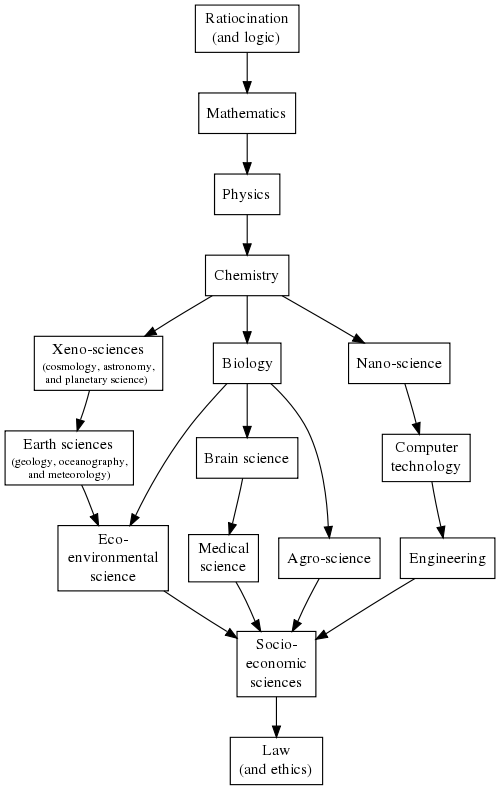- Outline of physical science
-
Physical science is an encompassing term for the branches of natural science and science that study non-living systems, in contrast to the life sciences. However, the term "physical" creates an unintended, somewhat arbitrary distinction, since many branches of physical science also study biological phenomena.
The following is presented as an overview of and topical guide to physical science:
Contents
General principles of the physical sciences
The foundations of the physical sciences rests upon key concepts and theories, each of which explains and/or models a particular aspect of the behavior of nature.
Basic principles of physics
Physics is the "fundamental science" because the other natural sciences (biology, chemistry, geology, etc.) deal with systems that obey the laws of physics. The physical laws of matter, energy, and the forces of nature govern the interactions between particles (such as molecules, atoms, or subatomic particles). Some basic principles of physics are:
- Describing and measuring motion
- Newton's laws of motion
- Forces, weight, and mass
- Momentum and conservation of momentum
- The theory of gravity
- Energy, work, and power
- Energy forms
- Energy conservation, conversion, and transfer.
- Energy source the transfer of energy from one source, to work in another.
- Kinetic molecular theory
- Phases of matter and phase changes
- Temperature and thermometers
- Energy and heat
- Heat flow: conduction, convection, and radiation
- The three laws of thermodynamics
- The principles of waves and sound
- The principles of electricity, magnetism, and electromagnetism
- The principles, sources, and properties of light
Basic principles of chemistry
Chemistry, built upon physical concepts, addresses phenomena associated with the structure, composition and energetics of matter and the changes it undergoes. Often known as the central science, chemistry connects the fundamental laws of physics to engineering and other natural sciences such as biology, earth science, astronomy and material science
 Chemistry, the central science, Partial ordering of the sciences proposed by Balaban and Klein.
Chemistry, the central science, Partial ordering of the sciences proposed by Balaban and Klein.
- Physical chemistry
- Theoretical chemistry
- Computational chemistry
- Nuclear chemistry
- The nature of the atomic nucleus
- Characterization of radioactive decay
- Nuclear reactions
- Organic chemistry
- Organic compounds
- Organic reaction
- Functional groups
- Organic synthesis
- Inorganic chemistry
- Inorganic compounds
- Crystal structure
- Coordination chemistry
- Solid-state chemistry
- Biochemistry
- Analytical chemistry
- Instrumental analysis
- Electroanalytical method
- Wet chemistry
- Electrochemistry
- Redox reaction
- Materials chemistry
Basic principles of earth science
Earth science is the science of the planet Earth, the only known life-bearing planet. Its studies include the following:
- The water cycle and the process of transpiration
- Freshwater, surface water, and ice
- Oceanography
- Geology
- Weathering and erosion
- Rocks
- Agrophysics
- Soil science
- Pedogenesis
- Soil fertility
- Earth's tectonic structure
- Geomorphology and geophysics
- Physical geography
- Seismology: stress, strain, and earthquakes
- Characteristics of mountains and volcanoes
- Characteristics and formation of fossils
- Atmosphere of earth
- Atmospheric pressure and winds
- Evaporation, condensation, and humidity
- Fog and clouds
- Meteorology, weather, climatology, and climate
- Hydrology, clouds and precipitation
- Air masses and weather fronts
- Major storms: thunderstorms, tornadoes, and hurricanes
- Major climate groups
- Speleology
Notable physical scientists
Universities offering named degrees in physical science
- Open University: BSc(Hons) Physical Science
- University of Amsterdam: MSc Physics/Chemistry, Track: Physical Sciences
External links
Outlines - General reference
- Culture and the arts
- Geography and places
- Health and fitness
- History and events
- Mathematics and logic
- Natural and physical sciences
- People and self
- Philosophy and thinking
- Religion and belief systems
- Society and social sciences
- Technology and applied sciences
Categories:- Natural sciences
- Physics
- Scientific terminology
- Outlines
- Describing and measuring motion
Wikimedia Foundation. 2010.
